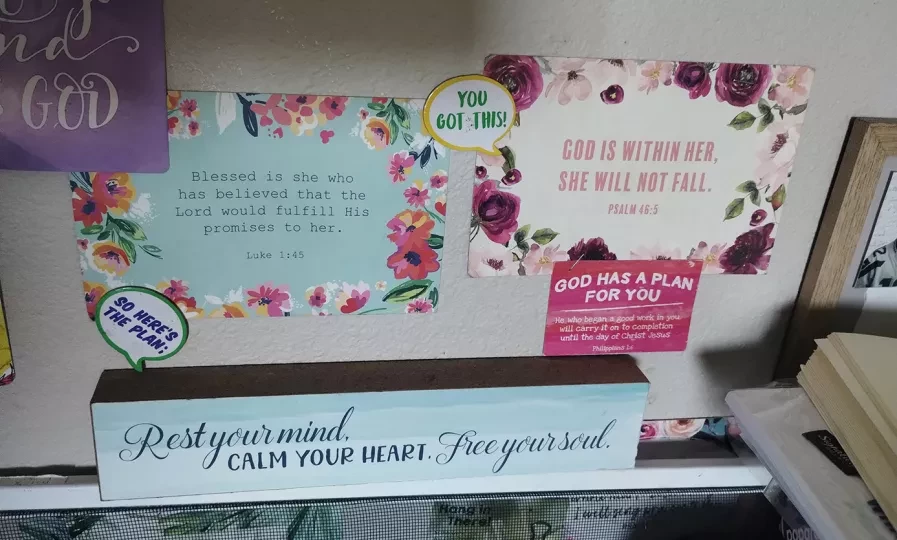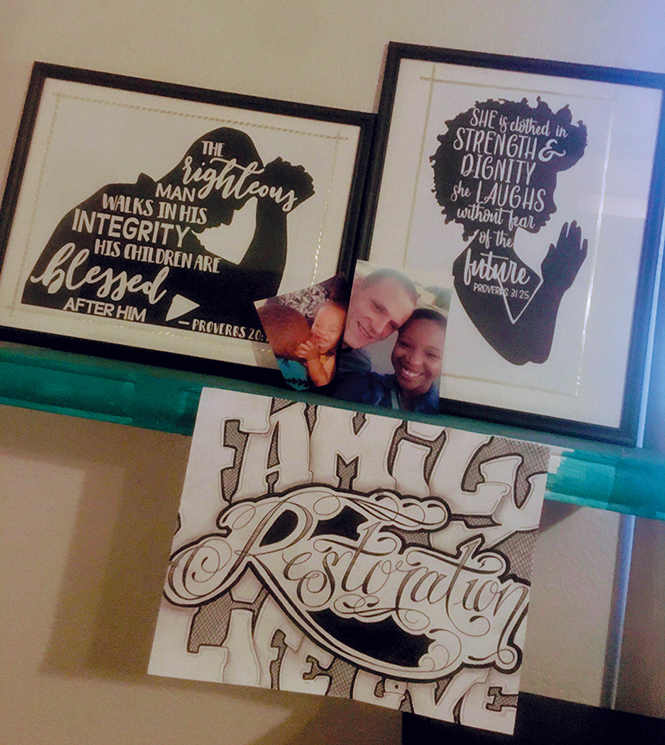Finding home: Marquita’s healing journey after meth addiction

Published February 3, 2025
After she called her pastor, after she admitted she couldn’t do it anymore, after making arrangements to go to detox, Marquita was terrified her life would never be the same.
“I was ready to go, and it was the scariest thing I could imagine,” she said. “It represented the actual end of everything I worked for.”
By all appearances, Marquita’s life was great. She had an amazing marriage with beautiful children. Her family was heavily involved in the church and had a beautiful house, which became “entertainment central.”
“We had barbecues and game nights and birthday parties. It was a gorgeous house; our dreams were coming true,” she said. “Now, I call it the forsaken house.”
‘I couldn’t see my future anymore’
Drugs were introduced to Marquita’s life shortly after she got back from a mission trip in Africa with her husband.
“We had done cocaine as soon as we touched down. I didn’t think anything of it. Our friends came over; we were partying and celebrating being back home,” she said. “Things happened very fast for me.”
To spend less money and stay high longer, Marquita and her husband started using meth. At first, she was excited about the energy it gave her. She had two young kids, was enrolled in college and worked two jobs, plus there was the new house to take care of.
“It was a lot of responsibility and not a lot of sleep. I remember thinking, ‘I don’t want to do this, but I still want it.’ It was confusing to me. My body wanted it even though I didn’t,” she said. “Nothing on the outside compared to what was happening inside. An agonizing rot set in, and I was dying slowly. My life was consumed.”
As the drug use started taking a harder toll on Marquita’s body, reality set in.
“It uncovered issues in our relationship and maturity and what we were really doing,” she said. “I had lived this life since getting married and having kids – rose-colored glasses, nothing could touch us, everything is good – and it wasn’t.”
Marquita tried outpatient treatment, but she didn’t do well in the group setting. Her life as she knew it was falling apart. She was losing weight, she didn’t have any money and her anxiety was so bad that she couldn’t leave for work on time. Everything she had worked for was crumbling.
“I cried almost every hit I took, and my honest belief is that’s the reason I was able to break free,” she said. “I kept it real with the drug, with God and myself, and I expressed all of this in journaling my prayers when I had no one else."
Even though she felt like she was losing everything, she didn’t tell anyone about the drug use. She stopped going to church and she didn’t want to leave her room.
“I was exhausted, not knowing what to do within my marriage and feeling like this was taking over my life, my identity,” she said. "I couldn’t see my future anymore.”
‘I found what I was looking for’
It’s taken trial and error for Marquita to find the support that works for her. The turning point came once she discovered harm reduction.
“That was the game-changer,” she said. “I didn’t have to be 100% sober, which wasn’t feasible at that time. I still have to get the kids to school, do all these things. I wasn’t being forced to come down (off of meth), because I didn’t feel like I could sleep long enough to make that possible.”
In 2023, Marquita still felt like she needed to talk to someone on a deeper level. She was looking for additional resources when she came across Face It TOGETHER. She read every coach’s story, including Kattie’s, who became her coach.
“Her story was just so similar to who I am as a person,” she said. “(I remember thinking), ‘This is it. I found the one.’”
Being paired with Kattie allowed Marquita to see someone who had found wellness after battling her own meth addiction. It was encouraging to see her coach in that stage of life.
“Even though we’re sober and dedicated to living a transformed life, there are still repercussions from the choices we made,” she said. “When you’re climbing up that mountain and it’s the most exhausting thing of your life, the person a step above you is helping you up. I found what I was looking for.”
Kattie also helped Marquita navigate post-acute withdrawal syndrome, sometimes called the “grey period.” It was helpful for her to learn what her body was going through biologically.
“The mental warfare that you go through is not something that is talked about a lot, even in the groups I went to. You don’t even necessarily know what you’re going through a lot of the time – it just feels like the end of the world,” she said. “That knowledge helped a lot. I could tell myself, ‘Your levels of dopamine have been depleted; it’s going to take a while.’”
Without the tools and support she’s received, Marquita said she would’ve been thrown off course. It was important for her to address the root cause of her addiction and lean on her mentors, including Kattie, and her family.
“Without these women, I don't know where I would be,” she said. “My mom, Stephanie, raised me the best she could and created a tenacious, ambitious, fierce woman in me. And my grandmother, Charlotte, taught me to keep the word of God on my lips and in my heart.”
For anyone who’s supporting a loved one with addiction, Marquita believes the most important thing to remember is love.
“Everyone's story is different, but every person I've met has something in common: pain,” she said. “We're all hurting and want love.”

‘It only gets better from here’
Marquita is slowly finding her way back to herself. She’s still learning how to be healthy and practice self-compassion. The rose-colored glasses and panic attacks are gone. Things feel more real now.
“I didn’t have a job. I didn’t make it to appointments consistently. I didn’t have a lot of the mental stamina that I do now,” she said. “A lot of growth has happened. The fact that you’re not doing it alone makes it a little easier. It only gets better from here.”
Despite her difficult journey, Marquita has always tried to show love to others struggling with addiction.
“I let people into my home, gave food, did laundry, was a shoulder to cry on, offered resources, shared laughs – gave whatever I had to give. They saw my walls, which were a reflection of my heart,” she said. “Being able to share those moments with people I probably never would have given the time of day, let alone access into my home, has shown me humility. My love for others has grown and I’ve developed a sense of justice – a reason to fight for others.
Marquita’s house is now a place where appearances don’t matter as much as they used to. Her walls reflect her belief in herself despite hardships.
“My home now I would say is very different. It's a mess but with less stress,” she said. “I have been getting better at focusing more on the loving and less on the living. Meaning how we live is everything to us, the driving factor in every choice we make. I'm learning my true home is this body I'm in. I used to loathe living in this godforsaken body, and now I’m happy being me.”
